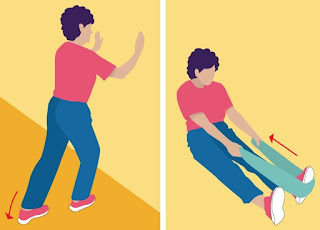Plantar Fasciitis in Running
The plantar
fascia is a ligament that runs underneath the soles of the feet. It connects
the heel bones to the front of the feet and also supports the arch.
Plantar
fasciitis is a condition caused by drastic or sudden increase in mileage, poor
foot structure and inappropriate running shoes, which can overload the plantar
fascia( the connective tissue that runs from your heel to the base of your toes
), resulting in heel pain.
How to
identify if you have Plantar Fasciitis?
·
Plantar Fasciitis sufferers feel a sharp stab or
deep ache in the heel or along the arch of their foot.
·
Taking a first step out of bed in the morning
could cause a sudden strain on the bottom of your foot, resulting in pain in
your heel or arch.
·
Pain can recur after long spells of sitting, but
it tends to fade during a run once the area is warmed up.
·
Another symptom that can be identified is pain
experienced during push off while running.
What could be the common causes for Plantar Fasciitis?
1) Over training can lead to plantar fasciitis, especially in runners overdoing hill running and speed work
2) Neglecting to stretch calf muscles. When one has very tight calf muscles, they will pull on the plantar fascia and cause a lot of pain.
3) Certain
bio mechanical issue can also lead to plantar fasciitis like flat feet with high
arches or excessive pronation ( fallen arch ).
4) A sudden increase in training mileage or when one begins their session directly with speed training.
5) Wearing
worn out shoes. Moreover, running on hard surfaces can also lead to plantar
fasciitis.
6) Wearing high heels all day and then switching into flat running shoes may also cause the issue.
Can Plantar Fasciitis be prevented?
Running is a heart pumping,
freeing and exhilarating workout, though it can also be a challenge. This may
be especially true for people with plantar fasciitis.
If you are runner with plantar
fasciitis, the big question is likely this: “Can is still run?”
In the short term, it is still
possible to continue running if one is dealing with mild to moderate case of
plantar fasciitis. But, if there is no plan of rehabilitation, the runner can
risk becoming side lined permanently.
A physiotherapist can be the best
person for planning a streamlined protocol for the runner to treat as well as
prevent Plantar fasciitis.
There can be certain ways a
runner can prevent Plantar fasciitis:
1) Support
your feet-
The first and foremost step is to
wear good quality running shoes with an appropriate arch support.
Taping and orthotics can both
help support you arches by decreasing stress and aggravation to you plantar
fascia.
Taping techniques for arch
lifting can be proficiently done by physiotherapist and it is a great way to
decide whether adding arch support would be helpful before spending too much
money on expensive orthotics.
2) Daily stretching exercises-
Being diligent about stretching
multiple times per day- your ankle, calf and the plantar fascia itself can keep
you running.
There is a strong connection
between tightness of the calf muscles and the severity of heel pain in cases of
plantar fasciitis.
In addition to stretching,
increasing or maintaining good ankle mobility is very important too.
3) A good warm up routine-
A runner must
spend at least 5 to 10 minutes if not more warming up before any type of
physical activity, If you are going for a run, focus more on dynamic
stretches(active movements where joints and muscles go through full range of
motion) and exercises that activate the hip muscles, quadriceps muscles,
hamstring muscles, gluteus muscles/buttock muscles, calf muscles.
4) Ice
after running-
After cool down stretches, some
icing would be beneficial. 10 to 15 minutes of icing to you plantar fascia
after any type of activity, but especially running can be relieving.
Ice packs and bags of crushed ice
work well. Ice bottle massage can be very effective to attack heel pain.











